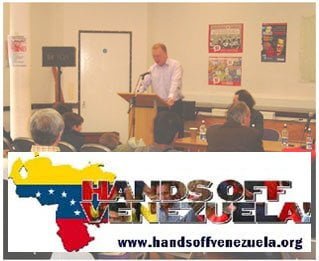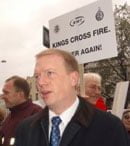Ian Aylet of the Socialist Appeal talked recently to Fire Brigades
Union General Secretary Matt Wrack on the challenges facing the FBU at
the present time, including the recent tragedy at Warwickshire where 4
Firemen were killed. As well as the ongoing fight against government
cut-backs, Matt also spoke about his recent attendance at the Hands off
Venezuela conference and the unions ongoing solidarity work with the
Venezuelan revolution.
IA: What are the main issues facing you at the present
time in the Fire Brigades Union?
 MW: I think the key issue is the recent tragedy in
MW: I think the key issue is the recent tragedy in
Warwickshire; four of our members were killed, which is the most serious number
of fatalities in 35 years, since the 1972 fire in Glasgow. So that’s a big
challenge for us to investigate it and provide support for the families, legal
support, financial support and so on – primarily to look at the incident itself
to try and prevent such things happening again. That’s obviously going to be a
long process, and we had already been concerned prior to that at what appears
to be a rising trend in fatalities in the past 4 or 5 years. We’ve got a number
of other fatal accident investigations still underway relating to those, so that’s
a key issue and people will understand that safety is a huge issue within the
fire service.
IA: Do you think this is a directly related to pressure on
budgets and cuts and so on?
MW: I wouldn’t want to pre-empt anything. We’re
investigating this particular case. What we will be doing is looking at all the
reports over the past four or five years and possibly getting in some
specialist assistance to see if there are trends, whether there are causes. I
think anecdotally people are giving their views but we’ve got to produce
properly thought out research before we jump to conclusions.
IA: Am I right in thinking that the other big industrial
issue facing you is regionalisation of the fire service?
MW: We have threats to our control rooms, where fire engines
and fire-fighters are mobilised, where the calls come into. The proposal from
the government is to regionalise them, and our concern is that in terms of cost
it won’t make the savings they claim. In fact it’s likely to increase the cost
of the fire service in terms of efficiency. We don’t see the benefits, and a
whole range of arguments that we’ve got – we think we’ve won the arguments
technically, operationally, financially, but unfortunately the government is
proceeding, so our campaign is continuing. We’re also engaged in discussions
with them about if these new control rooms go ahead what’s the terms and
conditions that people will be working to? As we are aware that some
politicians within the fire service are saying they’re going to use it as an opportunity
to try and get the FBU out of control rooms, and to try and slash pay and
conditions – obviously if that was the case then that’d be a huge battle for
us.
IA: You were elected in the wake of I think we’d have to
call it a failed industrial dispute, to be fair. How do you see the issues that
it was about working out over the next year or so?
MW: I think there’s an ongoing debate in the FBU about the
lessons from that dispute. What it undoubtedly did was unleash, on the part of
the government and employers, a whole raft of initiatives, what they call
‘modernisation.’ Unfortunately it all too often simply means cuts in the
service. As a result of that we’ve had an unprecedented number of local
disputes – in 2005 and 2006 we’ve had a number of local strikes, more than in a
similar period, more than ever in our history. I think the message was that the
employers thought that they had us beaten, thought they could get away with
whatever they wanted to at a local level, and our members have resisted that
and have shown that they can’t just get away with riding rough-shod over
fire-fighters. And I have to say that as a result of those battles some aspects
of industrial relations have improved in the past 2 or 3 months, but
interestingly we’ve got a potentially huge issue which is about ill-health
pensions. Again as result of the government’s modernisation agenda they’ve been
reforming public sector pensions, as we know. In the fire service, because of
the nature of the work, ill health and injury pensions are obviously key. We’ve
seen some guidance issued at the end of last year and again further guidance in
September of this year, which effectively means it would become virtually
impossible for anyone to get an ill-health pension, no matter what state they
are in physically. As a result of that we’ve got three retired members who have
had their pensions stopped, we’ve got another member who’s been attacked at
work – he’s a part-time fire-fighter, lost his employment in his main job, and
he’s now been told by the fire services that he’s likely to be sacked. So a disgraceful
attack on our pensions, and we’re engaged in discussions with the government. But
we held a national meeting yesterday and the clear message from our activists
was that, unless this is resolved, then that would be an issue that would lead
to a national strike ballot.
IA: On the broader issue of attacks on the public sector,
it seems the possibility of a united public sector fight back against
government cuts has receded this year. Do you think that’s true and what are
your feelings about how that’s panned out?
MW: As a principle I’m all in favour of people working
together as closely as possible. At the same time in terms of how negotiations
are conducted, clearly they’re conducted with different unions at different
times – that always makes a problem. For example in our own case we were the
only union that actually settled in the public sector after the 2% limit was
reinforced, we settled on pay with our own employers, without further interference
from the government, and in accordance with the union’s policies and the union’s
demands. That did breach the 2% limit, but that of course makes it difficult to
do anything else. Obviously we would support people in local government and in
health, depending on what they choose to do. I think as a longer-term process
it’s about the unions working together to challenge the fundamentals of what
the government’s up to, particularly in relation to pay policy over the next
couple of years.
IA: Which raises the issue of the Trades Union Congress. Do you think there is a role for the TUC in
coordinating national action against public expenditure cuts?
MW: I certainly think there can be. There is a liaison group
between public sector unions that meets regularly and has done some good work.
I think some of the work that was done, slightly before my election, on the
question of pensions between a number of the public sector unionism, shows that
you can adopt a common approach on key issues. I think there’s always going to
be tension between that and the individual agendas of particular unions, but I
think the challenge is to try to work together to try and put a common approach
as much as possible in the face of what the governments doing.
IA: Matt, you made a great speech at the Hands Off Venezuela conference. Do you want to say how
you felt about the Conference?
MW: I though it was an excellent Conference. As I said in my
speech the events in Venezuela were discussed at our union conference this year
and created a huge enthusiasm. So I’m keen that the FBU develops that
solidarity work. And we’re looking
forward to working with Hands Off Venezuela and with other trade unions about how we take that
forward.
IA: Thanks a lot Matt
MW: Cheers






